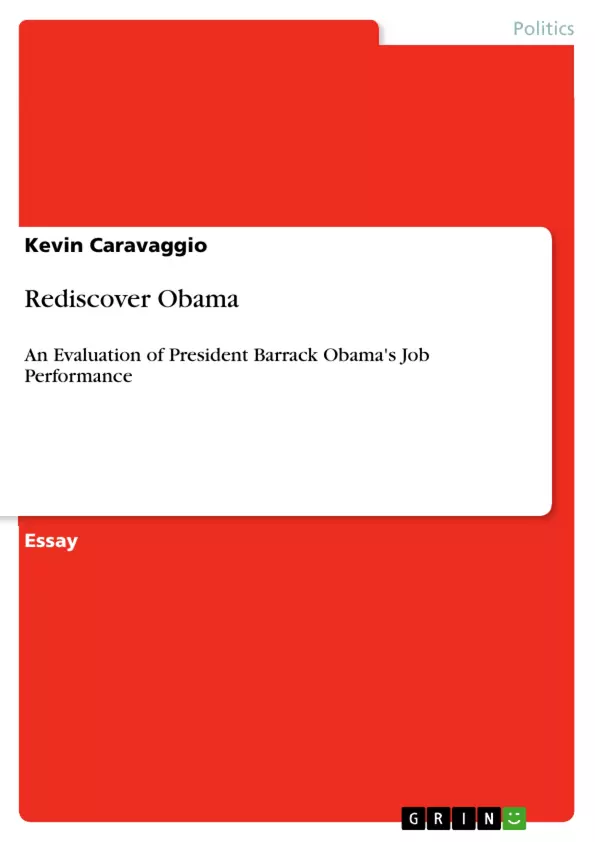On January 20, 2009 America inaugurated its first African American president ever, Barrack Obama. Obama is the 44th president of the United States. He was formerly a senator for Illinois and is a democrat. Some people dislike Obama which is acceptable. However, Obamahaters must acknowledge his proficiency regardless of their opinions because of his success in the economy, positive response to opposition, accomplishments off-shore, reforms in education,
and his support of the disadvantaged.
Inhaltsverzeichnis (Table of Contents)
- First of all, those who oppose Obama need to realize that, contrary to popular opinion, Barrack Obama's actions as president benefited the state of the economy.
- In the same way people who dislike Obama need to recognize that he has maintained a positive and productive demeanor despite the opposing party's disagreements with him throughout his presidency.
- Also, Obama's critics should merit his competency because of his progress in the middle east.
- In addition, people who don't support Obama should understand that he made good reforms to the education system.
- Lastly, those who oppose Barrack Obama should give him some degree of respect because he defends the "little people."
Zielsetzung und Themenschwerpunkte (Objectives and Key Themes)
The main objective of this text is to persuade readers to reconsider their opinions about Barack Obama by highlighting his accomplishments and positive attributes as President of the United States. The text seeks to challenge the common perception of Obama, particularly among his critics, by providing evidence of his positive impact in areas such as the economy, foreign policy, education reform, and social justice.
- Obama's positive contributions to the US economy, despite ongoing challenges and debt.
- Obama's effective leadership and response to opposition, demonstrating a commitment to constructive dialogue.
- Obama's significant international achievements, particularly in the Middle East, including the end of the Iraq War and the killing of Osama Bin Laden.
- Obama's positive impact on education, including his reform of the "No Child Left Behind" law.
- Obama's advocacy for the rights of marginalized groups, such as his support for gay rights and his efforts to address concerns raised by the Occupy Wall Street Movement.
Zusammenfassung der Kapitel (Chapter Summaries)
- The first section argues that, contrary to popular belief, Obama's presidency has positively impacted the US economy. It presents evidence of Obama's efforts to reduce the deficit and highlights the complexities of the national debt.
- The second section emphasizes Obama's ability to maintain a constructive approach towards opposition, despite significant political disagreements. It points to a specific instance where Obama encourages constructive debate and highlights his consistent response to criticism from the GOP.
- The third section focuses on Obama's successes in the Middle East, including the assassination of Osama bin Laden and the end of the Iraq War. It details the role Obama played in these events and underscores their significance.
- The fourth section examines Obama's positive impact on the education system. It details his efforts to reform the "No Child Left Behind" law and discusses the shortcomings of this previous policy.
- The final section highlights Obama's advocacy for the rights of marginalized groups. It discusses his support for gay rights and his response to the Occupy Wall Street Movement, illustrating his commitment to social justice.
Schlüsselwörter (Keywords)
The key terms and themes explored in this text include: Barack Obama, US presidency, economy, deficit reduction, opposition, political dialogue, foreign policy, Middle East, Iraq War, Osama bin Laden, education reform, "No Child Left Behind," social justice, gay rights, Occupy Wall Street Movement, marginalized groups, advocacy.
Frequently Asked Questions
What are the key economic achievements of Barack Obama's presidency?
The text argues that Obama's actions benefited the US economy, including efforts to reduce the deficit and manage the national debt during a challenging period.
How did Obama handle political opposition?
Despite significant disagreements with the opposing party, Obama is noted for maintaining a positive and productive demeanor and encouraging constructive debate.
What were Obama's major foreign policy accomplishments in the Middle East?
Key achievements include the end of the Iraq War and the successful mission that led to the killing of Osama bin Laden.
What education reforms were introduced under Obama?
Obama focused on reforming the "No Child Left Behind" law to improve the overall quality and fairness of the US education system.
How did Obama support marginalized groups?
He is recognized for defending the "little people," including his advocacy for gay rights and addressing concerns raised by movements like Occupy Wall Street.
- Citation du texte
- Kevin Caravaggio (Auteur), 2011, Rediscover Obama, Munich, GRIN Verlag, https://www.grin.com/document/183844



